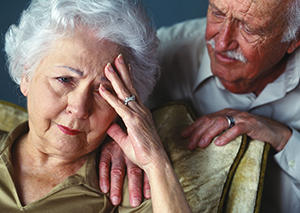Mood Swings and Depression After a Stroke
Mood Swings and Depression After a Stroke
After a stroke, a person may feel sudden or extreme emotions. Sadness and depression are common. These feelings may be due to damage in the brain. Or they may be a response to the person’s awareness of what has happened.
Coping with mood swings

You can help
Stay calm. Accept the behavior and go on with what you were doing.
If the person apologizes, acknowledge the behavior as a result of the stroke.
Don't criticize.
Treat the person with respect at all times.
Dealing with depression
A person may feel depressed after having a stroke. This may be due to brain damage. Changes in body image and grieving for lost skills, such as speech or freedom of movement, may also cause depression.
You can help
Ask the doctor whether medicine can help reduce the depression. You may need to take your loved one to see a psychiatrist or psychologist if he or she has severe depression.
Help the person stay active. Play games, watch TV, take a walk, or listen to music together.
Ask friends to visit if the person is willing to see them.
Don't discount depression by telling the person to “cheer up.”
Updated:
January 02, 2018
Sources:
Medical Complications of Stroke, Up To Date
Reviewed By:
Sudheendra, Deepak, MD,Turley, Raymond Kent, BSN, MSN, RN